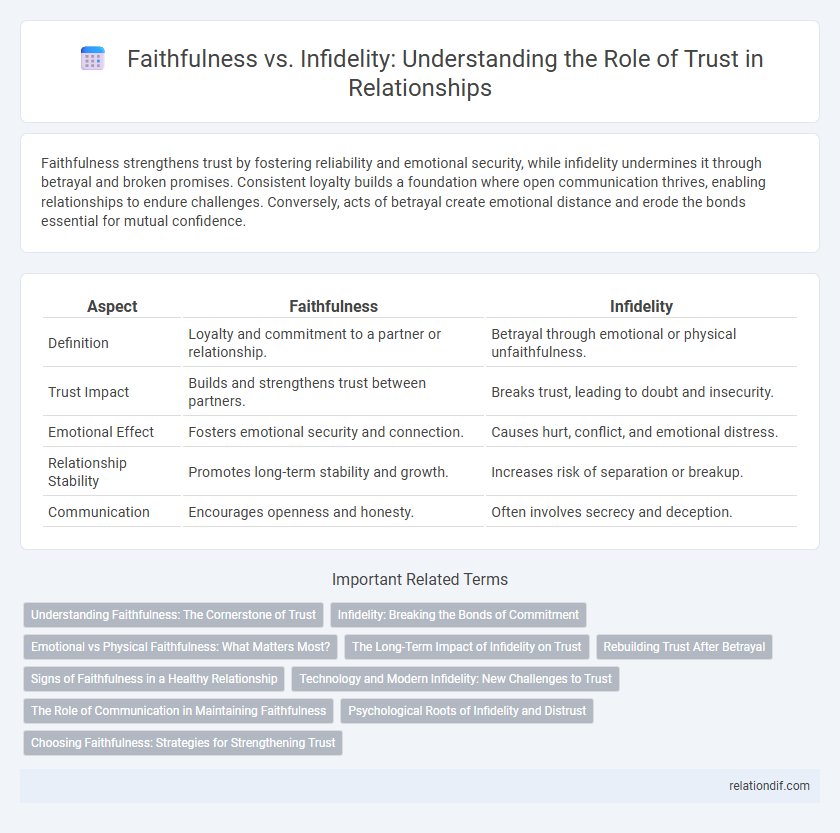Faithfulness strengthens trust by fostering reliability and emotional security, while infidelity undermines it through betrayal and broken promises. Consistent loyalty builds a foundation where open communication thrives, enabling relationships to endure challenges. Conversely, acts of betrayal create emotional distance and erode the bonds essential for mutual confidence.
Table of Comparison
| Aspect | Faithfulness | Infidelity |
|---|---|---|
| Definition | Loyalty and commitment to a partner or relationship. | Betrayal through emotional or physical unfaithfulness. |
| Trust Impact | Builds and strengthens trust between partners. | Breaks trust, leading to doubt and insecurity. |
| Emotional Effect | Fosters emotional security and connection. | Causes hurt, conflict, and emotional distress. |
| Relationship Stability | Promotes long-term stability and growth. | Increases risk of separation or breakup. |
| Communication | Encourages openness and honesty. | Often involves secrecy and deception. |
Understanding Faithfulness: The Cornerstone of Trust
Faithfulness serves as the cornerstone of trust by fostering reliability and deep emotional security in relationships. Consistent loyalty and honesty reinforce bonds, creating a foundation where vulnerability is met with assurance rather than doubt. Understanding faithfulness involves recognizing its role in maintaining integrity, mutual respect, and long-term commitment.
Infidelity: Breaking the Bonds of Commitment
Infidelity shatters the foundation of trust by betraying the commitment central to a faithful relationship, leading to emotional pain and fractured connections. The breach caused by unfaithfulness undermines the security and mutual respect necessary for a partnership to thrive. Restoring trust after infidelity requires transparency, accountability, and sustained effort to rebuild the damaged bond.
Emotional vs Physical Faithfulness: What Matters Most?
Emotional faithfulness fosters deep trust and connection, often proving more significant for relationship stability than physical fidelity alone. Physical infidelity can cause immediate harm, but emotional betrayal often leads to prolonged feelings of neglect and insecurity. Prioritizing mutual emotional commitment strengthens bonds and mitigates the risks associated with physical indiscretions.
The Long-Term Impact of Infidelity on Trust
Infidelity fundamentally undermines the foundation of trust, leading to long-term emotional trauma and persistent doubts in relationships. Recovery from betrayal requires consistent transparency and commitment, yet the shadow of past unfaithfulness often triggers chronic insecurity and diminished relational satisfaction. Studies reveal that couples facing infidelity experience prolonged trust deficits that can only be partially restored through sustained therapeutic intervention.
Rebuilding Trust After Betrayal
Rebuilding trust after betrayal demands consistent honesty, transparent communication, and accountability to repair emotional damage caused by infidelity. Establishing clear boundaries and demonstrating genuine remorse foster gradual healing, while couples therapy offers structured support for addressing underlying issues. Restoring faithfulness hinges on sustained commitment, patience, and mutual effort to rebuild a secure and trusting relationship foundation.
Signs of Faithfulness in a Healthy Relationship
Consistent honesty and open communication are key signs of faithfulness in a healthy relationship, fostering mutual trust and emotional security. Partners show faithfulness through respect for boundaries and commitment to shared goals, demonstrating reliability over time. Regularly prioritizing each other's needs and maintaining transparency also reinforce enduring loyalty and trust.
Technology and Modern Infidelity: New Challenges to Trust
Technology intensifies modern infidelity by enabling discreet communication through encrypted apps and social media, creating new challenges to trust in relationships. Online interactions blur boundaries between faithfulness and digital temptation, complicating emotional transparency and accountability. Advanced surveillance tools expose breaches, yet also fuel paranoia, making trust maintenance increasingly complex in the digital age.
The Role of Communication in Maintaining Faithfulness
Effective communication fosters transparency and emotional connection, which are essential in maintaining faithfulness within relationships. Expressing needs and concerns openly reduces misunderstandings and prevents emotional distance that often leads to infidelity. Consistent dialogue builds trust and reinforces commitment, serving as a crucial defense against breaches of loyalty.
Psychological Roots of Infidelity and Distrust
Psychological roots of infidelity often stem from unmet emotional needs, attachment insecurities, and underlying issues of self-esteem or unresolved trauma. Cognitive distortions and avoidance of vulnerability can fuel distrust between partners, eroding faithfulness. Understanding these deep-seated psychological factors is essential for restoring trust and fostering lasting emotional intimacy in relationships.
Choosing Faithfulness: Strategies for Strengthening Trust
Choosing faithfulness involves consistent communication, transparency, and mutual respect to reinforce trust within relationships. Implementing strategies such as setting clear boundaries, engaging in honest dialogue, and prioritizing emotional intimacy significantly reduces the risk of infidelity. Strengthening trust requires ongoing commitment to shared values and proactive efforts to address vulnerabilities before they escalate.
Faithfulness vs infidelity Infographic

 relationdif.com
relationdif.com